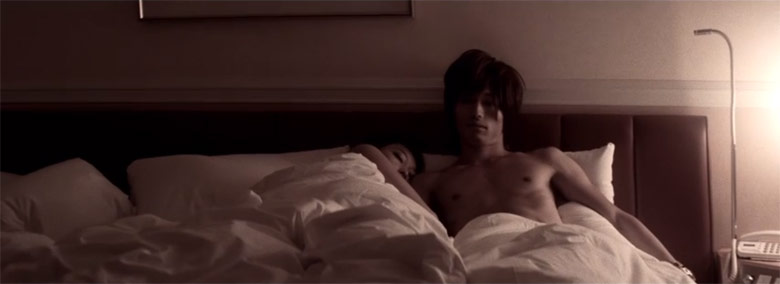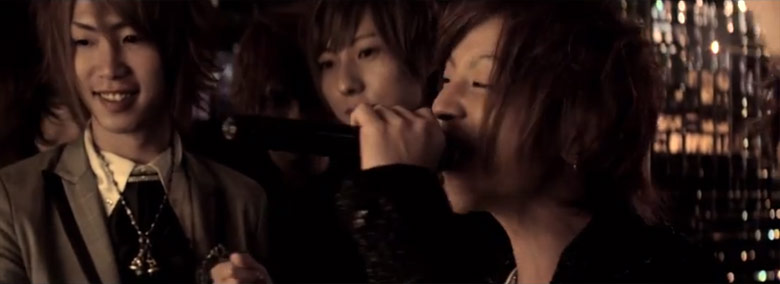Japanese translation by Katch, Matt Erik and Yoshiko Sanda
日本語翻訳:三田佳子、キャッチ・マシュー
The Belle Game – “River” Music Video
Can you talk a bit about the narrative and how that first came to form? Are there any overlapping themes between the song or record and the music video?
まずはこの映像についてどのように形づくられていったか、きっかけをお話しいただけますか。曲やアルバムとこの作品は同じテーマが重なっているのでしょうか。
Kheaven Lewandowski (Director // ディレクター)
The band sent me this statement about the song: “River describes a relationship where one person’s purpose is to take the burden of the other’s insecurities. It’s about craving the attention of the other and the willingness to take whatever they give, simply because it makes you feel as if they need you. In spite of this, it was important to us that the song didn’t have a victim… There’s something powerful about being in this position and we wanted this to come across, especially as the narrator reaches their breaking point.”
There were a lot of keywords and phrases that popped out at me and pushed me in certain directions. I can’t pinpoint when in the process I tried changing the setting to Japan, but something there seemed really intriguing to me. I really liked the idea of taking these universal themes and injecting it into a very specific niche culture and character. At that point I started researching Japanese subcultures, and that’s when I first learned about rent boys or “hosts”. There I found the basis for a character to express all these ideas we wanted to come through in the video. I think it was the third sketched out idea I sent them, was really happy they went for it.
「Riverと言う曲は、1人がもう1人の不安を背負う関係について描いています。一方はただ単純に必要とされていると感じたいので、少しでも気を引くためなら何でも補いたいのです。ただ、この関係においては、曲の中に一方的な被害者を作らないように気を付けました。特に主人公の限界が近付いた時に起こる、感動すべき何かを伝えたかったのです。」バンドは曲について手紙の中で語っています。
この手紙から私は様々なことを思い浮かべました。いつのまにか、舞台は日本に決めました。なぜか日本に惹かれました。私はこの普遍的なテーマをある種とてもニッチな文化やキャラに投影したかったのです。そこで日本のサブカルチャーを研究し、そうして売り専やホストなどについて初めて知ることになりました。ホストちう土台となる主人公像を見つけました。これは私がバンドに三番目にした提案でした。やっと決まった時は嬉しかったです。
The music video took five months to complete. What took so long? How much storyboarding was there to begin with, and how much did the narrative shift throughout the process?
PVが完成するまで五ヶ月もかかりましたね。なぜそんなにかかったんでしょうか。初めに絵コンテはどのぐらい描いたんですか。途中でストーリーを変化させたりしたのですか。
Kheaven Lewandowski (Director // ディレクター)
There was almost no storyboarding done, save for a few images I had in mind for certain scenes. I developed a shot list the day before each shoot day (3 in total), based on what I knew of the locations, and what story beats we had to hit. But it was more about consciously not getting married to any one way of how I wanted to shoot things – and more about quickly coming up with a way to best take advantage of the space we had to work with. It was mostly shot guerrilla-style, so the luxury of time and multiple takes was not an option. We had to embrace that mentality; to be present and on our toes the whole – I think it bred a lot of great moments.
The narrative surprisingly remained almost completely unchanged from the written treatment. The mantra throughout the production was always that “the story needs remain intact”. Luckily, Jason Aita (our Canadian producer who was with us), was really on top of making sure we didn’t miss story beats – as well as getting all the pieces we needed to communicate the Rent Boy profession. Other variables in the story did change though, like for example, hitching a ride with a Bōsōzoku biker gang vs. a Dekotora truck driver.
特殊な場面以外には、絵コンテはほとんど描いていません。三回の撮影の前日に、私は撮影場所とプロットで撮影シーンをリストアップしました。でも、具体的にとるシーンを一つに決めずに、現場での限りある時間の中でいいカットが撮れるように頑張りました。ほとんどゲリラ的な撮影です。だからあまり同じシーンを何度も撮る十分な時間はありませんでした。この様な特別な撮影のため、いざという時に集中して注意を払い、些細なことにも素早く対処しました。おかげで本当に沢山すごいカットができたと思います。
驚いたことにストーリーは初めの台本からあまり変わりませんでした。製作の間、共通目標として話の骨組みを変えないように心がけていました。幸いなことに、Jason Aita(私達のカナダのプロデューサー)は特に話の骨組みについてこだわっていました。さらにホストの仕事をリアルにするために小道具などもよく集めました。骨組み以外の様々な撮影内容は変えることになりました。例えば、暴走族と一緒にバイクに乗ったり、デコトラに乗ったりするのはボツにしました。
Adam Nanji (The Belle Game // バンドのメンバー)
What is your experience with Japanese culture, and how difficult or easy did you find it to create a piece that expresses an authentic understanding of the country and this specific culture of rent-boys?
日本の文化について何か経験をされたことがありますか。このホストというニッチな文化を正確に映像で表現することは難しかったですか?
Kheaven Lewandowski (Director // ディレクター)
There was a few key things that I felt would contribute immensely to the authenticity of the video, and one of them was to shoot at a real host club. It was an incredible feat that our production manager, Chiaki Saito, managed to get us a real host club location – with real rent boys no less! I was pushing for it the whole time, but was warned it would be nearly impossible because all these clubs reside in the biggest Yakuza-controlled neighborhoods in Japan, called Kabukichō, and it would have been out of our budget range to pay them off. But Chiaki somehow arranged for us to meet a club owner, who liked the idea, and agreed to let us shoot there for a few hours with her actual hosts.
We shot the “champagne call” scenes in a faux documentary approach, by simply getting the hosts to go through the process as they would normally would, except with our actor in place as the main guy. Ben Loeb, my cinematographer and I, would do a bit of a dance in covering the action, but we did two takes in two setups, and that was that. It was quite surreal talking to 30 Japanese people with a translator behind me; luckily, the language barrier didn’t slow us down too much.
I also wanted our lead actor, Hiraku Kawakami, to solicit girls outside the club, which we learned was illegal, so our hosts weren’t able to do it. But as we were shooting some exteriors around Kabukichō, I noticed a group of rent boys from a different club trying to wrangle girls passing by. I asked Hiraku to walk up to them in-character, and to just go along with it and do what they do. It made for some really authentic footage that made it into the intro of the video. Soon after, we were told by a suited Yakuza member to stop filming and to leave – we got off easy, according to our local crew.
Any other sort of authenticity that comes through I think was just a result of asking Hiraku a thousand questions about everything. He was very much our cultural compass in keeping things authentic.
映像をよりリアルにするために本当のホストクラブでカットを撮ることは大切でした。私達の作品マネージャーのサイトウチアキさんは驚いたことに本当のロケ地を見つけてきました。本物のホストもいたのです!そのままそこを使いたかったんですけど、大体ヤクザが仕切っている歌舞伎町という場所にクラブがあるので、予算内ではヤクザたちに賄賂を払ったりすることはできないので無理だと思っていました。しかしチアキさんはどういうわけか、映像のアイディアに賛成してくれるクラブオーナーと会う約束を取り付けてくれました。本物のホストを数時間内撮ることができました。
“シャンパンコール”のシーンはドキュメンタリーを作るスタイルを使いました。本物のホストはいつもの仕方をしてもらい、俳優はメインのホストの役になりました。Ben Loeb(メーンのカメラマン)と私は皆の周りにカットにおさめるためにちょこちょこと動きまわりました。2つセットを作って2回撮り直してできました。30日本人と通訳者に頼りながら話すのはかなりシュールな経験でしたが、幸いなことに言葉の壁はあまり問題には感じませんでした。
カワカミ ヒラクさん(主人公の俳優)がクラブ以外で女性を口説くシーンも撮りたかったのですが、それは違法なのでできませんでした。歌舞伎町の路上で本物のクラブのホストが女性を口説いているのを撮ろうと思いました。その光景の中にヒラクさんは主人公のホストとして紛れ込ませました。それでPVのイントロためにいいカットができました。しかし私達はヤクザは「やめろ!」と怒られました。後で日本のスタッフはそれだけで済んだだけでラッキーだと言っていました。
ヒラクさんに様々な質問をたくさん聞きました。彼のおかげでリアルになりました。本当に彼は私達にとってその道の権威のような人でした。
Adam Nanji (The Belle Game // バンドのメンバー)
Have you seen films of similar themes being produced within Japan? Do you know how the video is received there, and whether it differs at all from international reactions?
日本からこのようなテーマがある映像を見たことありましたか。日本で映像はどんな反応がありましたか。他の国とは違ったリアクションがあったのでしょうか。
Kheaven Lewandowski (Director // ディレクター)
Adam Nanji (The Belle Game // バンドのメンバー)
Hiroshi Mon Amour Trailer
The Guardian recently published an extremely fascinating article about the view of Japanese youngsters on sex. In your research, personal experience, or in the process of making this music video, might you have any opinions or thoughts to shed on this matter?
最近The Guardian紙は日本人の若者のセックスについての意見の記事を発表しました。この話題について考えがありますか。 http://www.theguardian.com/world/2013/oct/20/young-people-japan-stopped-having-sex
Kheaven Lewandowski (Director // ディレクター)
Ω
The Belle Game – “Wait Up For You” Music Video
Directed by Kheaven Lewandowski
Ω









